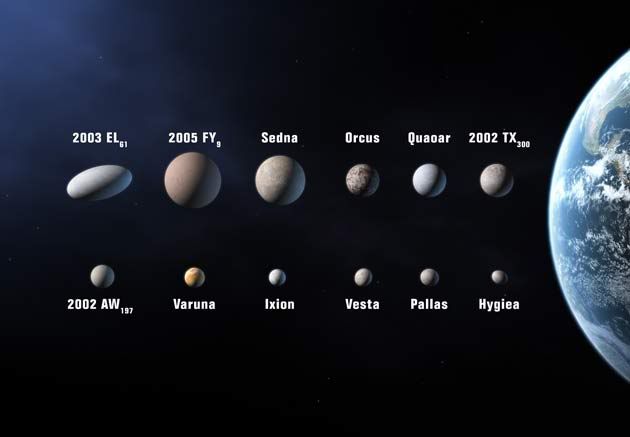Nine Planets may Become 12 or more
Nine Planets Become 12 with Controversial New Definition
Robert Roy Britt, Senior Science Writer
August 16, 2006

The 12 planets under the newly proposed IAU definition. Planet sizes are shown to scale but their orbital distances are not to scale. Credit: IAU/Martin Kornmesser

In proposing a new planet definition, the International Astronomical Union put 12 objects on a watch list of candidates that need further study. They are shown here to scale with Earth. Credit: IAU/Martin Kornmesser
_____________________________________________________________________
The tally of planets in our solar system would jump instantly to a dozen under a highly controversial new definition proposed by the International Astronomical Union (IAU).
Eventually there would be hundreds as more round objects are found beyond Neptune.
The proposal, which sources tell SPACE.com is gaining broad support, tries to plug a big gap in astronomy textbooks, which have never had a definition for the word "planet." It addresses discoveries of Pluto-sized worlds that have in recent years pitched astronomers into heated debates over terminology.
The asteroid Ceres, which is round, would be recast as a dwarf planet in the new scheme.
Pluto would remain a planet and its moon Charon would be reclassified as a planet. Both would be called "plutons," however, to distinguish them from the eight "classical" planets.
A far-out Pluto-sized object known as 2003 UB313 would also be called a pluton.
That would make Caltech researcher Mike Brown, who found 2003 UB313, formally the discoverer of the 12th planet. But he thinks it's a lousy idea.
"It's flattering to be considered discoverer of the 12th planet," Brown said in a telephone interview. He applauded the committee's efforts but said the overall proposal is "a complete mess." By his count, the definition means there are already 53 known planets in our solar system with countless more to be discovered.
Brown and other another expert said the proposal, to be put forth Wednesday at the IAU General Assembly meeting in Prague, is not logical. For example, Brown said, it does not make sense to consider Ceres and Charon planets and not call our Moon (which is bigger than both) a planet.
IAU members will vote on the proposal Thursday, Aug. 24. Its fate is far from clear.
The definition
The definition, which basically says round objects orbiting stars will be called planets, is simple at first glance:
"A planet is a celestial body that (a) has sufficient mass for its self-gravity to overcome rigid body forces so that it assumes a hydrostatic equilibrium (nearly round) shape, and ( ![]() is in orbit around a star, and is neither a star nor a satellite of a planet."
is in orbit around a star, and is neither a star nor a satellite of a planet."
"Our goal was to find a scientific basis for a new definition of planet and we chose gravity as the determining factor," said Richard Binzel, an MIT planetary scientist who was part of a seven-member IAU committee that hashed out the proposal. "Nature decides whether or not an object is a planet."
"I think they did the right thing," said Alan Stern, a planetary scientist at the Southwest Research Institute and leader of NASA's New Horizons robotic mission to Pluto. Stern expects a consensus to form around the proposal.
"They chose a nice economical definition that a lot of us wanted to see," Stern told SPACE.com. "A lot of the other definitions had big problems. This is the only one that doesn't have big problems."







3 Comments
Recommended Comments
Create an account or sign in to comment
You need to be a member in order to leave a comment
Create an account
Sign up for a new account in our community. It's easy!
Register a new accountSign in
Already have an account? Sign in here.
Sign In Now